Assuredly, the word of truth can be painful and uncomfortable. But it is the way to holiness, to peace, and to inner freedom. A pastoral approach which truly wants to help the people concerned must always be grounded in the truth. In the end, only the truth can be pastoral.
Distinction Matter - Subscribed Feeds
-
Site: The Unz ReviewIn Shelley’s most famous poem, the relics are described of Ozymandias, the ancient ruler with his “sneer of cold command” and his ill-fated power projection: Wess Mitchell, whose grand strategy for Trump was announced this week in Foreign Affairs, the platform of the Council on Foreign Relations in New York, places Trump among the rulers...
-
Site: The Unz ReviewThe notion that the Greeks or Romans — or even the Barbarians — were incapable of rising above polytheism to the concept of a universal God, and that Europeans needed Jewish monotheism — in the form of Christianity — to “know” “God”, is the seminal Jewish lie that has alienated us from our Roman past,...
-
Site: The Unz ReviewA few readers thought I went a bit too far in my column two days ago when I expressed concern that if President Trump loses the existential conflict between Mega Americans and the corrupt anti-American Establishment, a return to power of the Democrats will mean oppression for traditional white ethnic Americans. Not in America, they...
-
Site: The Unz ReviewThe key MAGA issue is not foreign policy, but how to structurally re-balance an economic paradigm in danger of an extinction event. Trump clearly is in the midst of an existential conflict. He has a landslide mandate. But is ringed by a resolute domestic enemy front in the form of an ‘industrial concern’ infused with...
-
Site: AntiWar.com“There are two ways Iran can be handled,” U.S. President Donald Trump has said, “militarily, or you make a deal.” National Security Adviser Mike Waltz advocated for the military solution; Director of National Intelligence Tulsi Gabbard and Vice President JD Vance advocated for diplomacy. Trump has opted for diplomacy. But all options are still on … Continue reading "Seven Reasons Why It’s Absurd To Bomb Iran"
-
Site: The Unz ReviewAccording to DeepSeek, the Great Replacement is not a conspiracy theory The following is a copy and paste of a debate I had with DeepSeek, the Chinese-made AI that’s causing such a stir at the moment. It starts badly, but as you read on, you’ll realize that this software is really intelligent. It is even...
-
Site: The Unz ReviewYesterday was St. George’s Day — or something close to it. It is technically next week because the Church of England says a feast day cannot be within a week of Easter. Nonetheless, in political terms, St. George Day’s was yesterday for post-Christian England, and like everything else, it is a political battleground. Prime Minister...
-
Site: The Unz ReviewThe world mourns Pope Francis, a good, loving man who brought the Holy Mother Church back to the people and made his native Argentina proud. Francis was a welcome change after the orthodoxy and rigidity of former Pope Benedict XVI who sent an icy chill through Catholicism. Francis did a lot to soften the image...
-
Site: The Unz ReviewThirty years after the end of the Cold War, European elites are shouting once again that the Russians are coming. Why would they bother invading European NATO states when everything that makes life possible in Europe is collapsing? “The Russians can be here at any moment! The Russians have a huge army, ready to invade....
-
Site: The Unz ReviewIraq is reducing its reliance on Iranian gas (40% of its needs) by boosting domestic production. Major projects with TotalEnergies, GE Vernova, Siemens, and others aim to capture flared gas, build power plants, modernize grids, and expand solar capacity. Iraq’s strategy seeks energy independence while navigating U.S.-Iran tensions, sanctions risks, and internal corruption. Iraq is...
-
Site: AntiWar.comOn Palm Sunday (April 13), Israeli bombs destroyed the surgery and intensive care sections of the “last fully functional hospital in Gaza City,” according to a report by the British Broadcasting Corporation. The hospital was run by the Episcopal Diocese of Jerusalem, part of the Anglican Church. The bombs also struck surrounding buildings, including St. … Continue reading "Israel – Killing Ambulance Workers, Starving Little Children"
-
Site: RT - News
The tech billionaire and US Treasury secretary have clashed over who should control the Internal Revenue Service
Tech billionaire Elon Musk and US Treasury Secretary Scott Bessent were involved in a heated shouting match inside the White House last week, reportedly trading expletives and personal insults during a confrontation over leadership of the Internal Revenue Service (IRS), according to Axios.
The incident reportedly unfolded in the West Wing on Thursday within earshot of President Donald Trump and visiting Italian Prime Minister Giorgia Meloni. The two men argued over Trump’s recent decision to name Gary Shapley, Musk’s preferred candidate, as acting IRS commissioner – a move that blindsided Bessent, who had lobbied for his deputy, Michael Faulkender.
“It was two billionaire, middle-aged men thinking it was WWE in the hall of the West Wing,” one witness told Axios on Wednesday.
Musk reportedly accused Bessent – a former partner at Soros Fund Management and the founder of Key Square Group – of being a “Soros agent.” Bessent “roared” back, at one point allegedly shouting “F**k you,” to which Musk replied, “Say it louder.”
Read more Musk promises to cut back on White House role
Musk promises to cut back on White House role
The clash did not escalate into physical violence, but was loud enough to be heard in nearby offices, according to multiple sources. Witnesses said an aide had to physically step in between the two men to prevent the situation from intensifying.
White House Press Secretary Karoline Leavitt downplayed the incident, telling the New York Times that “disagreements are a normal part of any healthy policy process,” and that “ultimately, everyone knows they serve at the pleasure of President Trump.”
Bessent ultimately came out on top, with Shapley replaced by Faulkender just days after the appointment.
Read more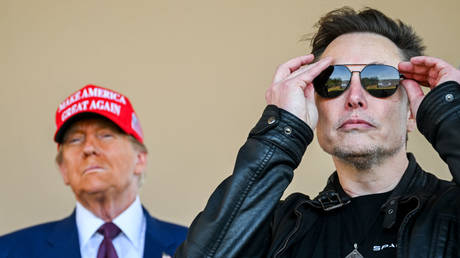 Musk’s SpaceX frontrunner for Trump’s missile shield – Reuters
Musk’s SpaceX frontrunner for Trump’s missile shield – Reuters
“Trust must be brought back to the IRS, and I am fully confident that [Deputy Secretary] Michael Faulkender is the right man for the moment,” Bessent said on X Friday afternoon.
“Gary Shapley’s passion and thoughtfulness for approaching ways to create durable and lasting reforms at the IRS is essential to our work, and he remains among my most important senior advisors at the [US Treasury] as we work together to rethink and reform the IRS.”
The altercation highlights long-standing tensions between Musk and Bessent dating back to the presidential transition, when Musk unsuccessfully pushed for Howard Lutnick to lead the Treasury Department. Trump instead appointed Bessent and nominated Lutnick to head the Commerce Department. Since then, Musk and Bessent have clashed repeatedly over personnel and policy, including Musk’s Department of Government Efficiency cost-cutting initiative, which Bessent claimed has failed to deliver on its promises.
-
Site: RT - News
Russia will not ignore the expansion of potentially hostile military infrastructure on its borders, Dmitry Peskov has said
Russia has never had any problems with Finland or Sweden joining NATO, but will respond to the expansion of the bloc’s military infrastructure as it “deems necessary,” Kremlin spokesman Dmitry Peskov has said.
Finland abandoned its longstanding policy of neutrality and became a NATO member in April 2023, citing security concerns over the Ukraine conflict. Sweden followed suit in 2024 on the same pretext. In response, Moscow vowed to adjust its defensive posture in northwestern Russia, and stressed that unlike Ukraine, their accession does not pose an existential threat to Russia.
NATO military infrastructure has been “gradually appearing on Finnish territory” in recent years, Peskov said in an interview with French weekly Le Point published on Wednesday.
“How is Russia reacting? It takes measures to improve its security that our military deems necessary,” he stated.
Read more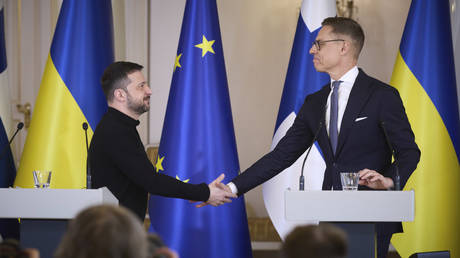 Militarize Ukraine ‘to the teeth’ – Finnish president
Militarize Ukraine ‘to the teeth’ – Finnish president
The Kremlin spokesman stressed that Russia never had “any problems” with Finland or Sweden joining NATO and has no intention of launching any attacks. “Fortunately, neither the Baltic countries nor Finland are firing at Russians from tanks and airplanes, in contrast to what has been happening in Donbass since 2014,” Peskov added.
According to a NATO policy update published last month, the bloc is “continuing to integrate NATO’s newest members – Finland and Sweden – into plans, forces, and command structures, including by developing a presence in Finland.” The document praised Sweden for assuming the “framework nation role in the enhanced forward presence in Finland.”
NATO Secretary-General Mark Rutte said earlier this month that member states are also “working together” in the Arctic to “defend this part of NATO territory.”
Read more Putin issues Arctic warning to NATO
Putin issues Arctic warning to NATO
Russian President Vladimir Putin addressed the issue at the International Arctic Forum last month, saying Moscow has been “closely monitoring” the region and responding accordingly.
“We are, of course, concerned by the fact that NATO countries as a whole are more frequently designating the far north as a bridgehead for possible conflicts, practicing the use of troops in these conditions, including their new recruits from Finland and Sweden,” Putin said.
He added that Russia has responded “by increasing the combat capabilities of the armed forces and modernizing military infrastructure facilities.”
-
Site: Public Discourse
Editor’s Note: This essay is part of a week-long series of essays at Public Discourse reflecting on Pope Francis’s pontificate, his legacy, and the Catholic Church’s future.
On the day of Pope Francis’s election, I spoke with a respected Jesuit professor, offering him my congratulations on a Latin American Jesuit’s becoming pope. To my surprise, he looked dour. This was bad news, he said. Fr. Bergoglio had had a reputation for being an authoritarian provincial; the Jesuits in Argentina had a lot of trouble with him.
In time, the professor’s premonition proved correct. The man who had been a difficult superior became a difficult pope. As I have reflected on Pope Francis’s words and actions over the years, I realized that if I treated my sons the way Francis treated my fellow believers and me, I would rightly be considered a bad father. This remains the best hermeneutical key I know for explaining Francis’s pontificate: he was a man whose tragic flaws undermined the good he sought to do and the duties of the office that he bore. When such a father dies, it is fitting to mourn his passing. But it is also fitting to name the damage done and lament the growth and closeness that could have been there. Perhaps a reflection on fatherhood can serve as a diagnosis of the recent pontificate, and provide some counsel for the next one.
A good father loves his children by keeping order in the home. Children need to know what they can expect from their parents. Parents, in turn, need to treat their children fairly and not play favorites. Discipline should be clear and regular, firm but not harsh, edifying without being humiliating or insulting. Parents should explain why they are acting as they do in terms that children can understand. By this common standard, Pope Francis was a deeply flawed father. His remarks frequently stung, whether or not they were intended as insults: large families that breed like rabbits, priests who cling to grandma’s lace, seminaries with too much “frociaggine.” Then there were the actions taken to undermine the faithful who should have been his most loyal followers, most notably the restrictions on the Latin Mass. Too often during his pontificate, the faithful were left waiting for the other shoe to drop.
Or not drop, as the case may be. For, as J. D. Flynn and Ed Condon have amply documented, Francis undermined the rule of law in the Church and made its application deeply personal. Their report concludes: “When instability replaces the rule of law, the law no longer becomes the tool protecting human dignity that Pope Francis praised; rather, it becomes an instrument that can be wielded arbitrarily, to the harm of that same dignity.” Flynn and Condon offer numerous cases of this, but the most infamous are connected to sexual predation and are well known: Marko Rupnik, Gustavo Zanchetta, Juan Barros, and Ariel Alberto Principi. If Pope Francis had “a pontificate of the heart,” it was unfortunately a heart too wedded to its own judgment and preferences.
A similar dynamic played out in his teaching magisterium. A good father teaches his children the truth about themselves and the world around them. He hands on skills, lore, and family traditions. But most importantly, he tells children their own story, from the way their parents met to the fact that God has created them to love him and the world that he ordered well. He leaves room for them to question and discern, but provides a bedrock of belief on which they can build their lives. He teaches them right from wrong and inspires a vision of what the moral life looks like when lived well.
Unfortunately, Pope Francis sowed confusion where clarity was much needed, inasmuch as his teachings on certain issues seemed to contradict the Church’s tradition and practice. This was a matter of both form and content in many of the documents of his pontificate. Too often his writings exhibited a disregard for rigorous, clear thinking rooted in the Church’s tradition, or framed such thinking as the enemy of real pastoral work. Too often they seemed to create ambiguities that allowed for work-arounds to the universal call to holiness. Take the case of Amoris Laetitia. As I noted when it was published, the document treats Christ’s teaching about marriage in three different ways: “exhorting it as an ideal—noble to be sure but too difficult for many (298, 307); repeating it as a doctrine or a duty (134); and stressing it as a moral issue without regard for the consciences we might be burdening in the process (37).”
Francis cited Thomas Aquinas to argue that general principles may be necessary in pastoral discernment, but they break down as we descend into particular cases (AL 304; ST I-II q. 94 a. 4). The passage comes from the Summa’s discussion of natural law. But Christ clarified that the indissolubility of marriage is part of the divine law, whose purpose is to lead us to communion with God forever. And the new law of Christ is the grace of the Holy Spirit dwelling within us, in part by means of the sacraments, including “indissoluble matrimony” (ST I-II q. 106 a. 1–2). In short, I concluded, “Thomas corrects how Amoris Laetitia tends to speak about indissolubility. The New Law Christ teaches is not just a matter of natural law, a duty, a moral issue, or an ideal. It is life-giving, perfect; it revives the soul and giving joy to the heart (cf. Psalm 19:7–8). Christ’s teaching about marriage clarifies the path of perfection God desires for us. But it also turns that path into a sacrament, a vehicle by which the Holy Spirit fills our hearts with love and realizes that perfection in us.”
Or take the case of Francis’s second social encyclical, Fratelli Tutti. Chapter 2 offers a moving exegesis of the parable of the Good Samaritan, and later Francis reminds his readers of the connection between the right to private property and the universal destination of goods. Unfortunately, other parts employ argumentation that becomes embarrassing. Francis exceeds his predecessors’ condemnation of capital punishment by calling life imprisonment “a secret death penalty,” but never gives a sense of what to do with unrepentant, dangerous criminals. As I observed after its publication, “He concludes by writing that Christ’s command to Peter to sheathe his sword (Matt. 26:52) is an echo of the ancient warning: ‘I will require a reckoning for human life. Whoever sheds the blood of a man, by man shall his blood be shed’ (Gen. 9:5–6). An echo may be there, but Francis ends multiple paragraphs against capital punishment with the first of many divine commands for it.”
Capital punishment proved to be a sample case for Francis’s approach to the theological tradition. As Ed Feser has ably argued, the Catholic Church has repeatedly taught throughout its history that capital punishment is permissible. Popes John Paul II and Benedict XVI made it clear that they believed as a prudential matter that it should very rarely be used. But Francis changed the Catechism of the Catholic Church to say that the death penalty was “inadmissible because it is an attack on the inviolability and dignity of the person” and made statements that clearly implied the death penalty per se violates the natural law and the law of the gospel.
However, Feser argues: “If capital punishment is wrong in principle, then the Church has for two millennia consistently taught grave moral error and badly misinterpreted scripture. And if the Church has been so wrong for so long about something so serious, then there is no teaching that might not be reversed, with the reversal justified by the stipulation that it be called a ‘development’ rather than a contradiction.” Hence Cardinal Avery Dulles, who was personally opposed to capital punishment, argued that “the reversal of a doctrine as well established as the legitimacy of capital punishment would raise serious problems regarding the credibility of the magisterium.” In this matter as in others, Francis was more concerned with getting to the answer he wanted than with the impact that would have on the Church’s doctrine as a whole.
Later in Fratelli Tutti, Francis dismisses the entire just war tradition in a footnote. He writes that “war can easily be chosen by invoking all sorts of allegedly humanitarian, defensive or precautionary excuses.” True enough, although John Paul II called for exactly such intervention to stop atrocities in Yugoslavia. He claims that “every war leaves our world worse than it was before. War is a failure of politics and of humanity, a shameful capitulation, a stinging defeat before the forces of evil.” But then one thinks of Great Britain, which Benedict XVI thanked for “courageously resisting the forces” of Nazi tyranny. Francis concludes by arguing that military spending should be redirected to “establish a global fund that can finally put an end to hunger and favor development in the most impoverished countries, so that their citizens will not resort to violent or illusory solutions, or have to leave their countries in order to seek a more dignified life.” We should not be surprised that a few years later, the people of Ukraine would find his response to their plight frustrating.
In sum, Francis was much more interested in solving pastoral problems than in theological doctrines. But his responsibility was to safeguard the Church’s doctrine and to cherish and promote its theological reasoning. It is a cause of enduring sadness that he failed to do so. His successor should take this task up again with renewed vigor. And he should remember that in the Church, theological reasoning outlasts politics. Francis made a mess, but messes can be unmade.
During Pope Francis’s final days, numerous outlets reported an increasing number of conversions to Catholicism in the U.S., France, and Britain. Francis and his inner circle had a complicated relationship with converts, especially American ones. He appeared not to understand how beauty and tradition are important and attractive to young people, how justice and order are for the Church’s good, and how doctrinal clarity and stability make the Church a shelter in the midst of the storms of our age. As Ross Douthat recently put it, we live in “an age of extinction” in which technology-driven change puts pressure on social institutions and inherited beliefs. Catholicism will flourish insofar as it is chosen and practiced, not inherited and taken for granted. It will require spiritual fathers who give persuasive answers to the question “Why should I become Catholic?” Let us pray that the next pope can do so, joyfully.
Image by JoniVideography and sourced via Wikimedia Commons.
-
Site: RT - News
The US president previously accused the Ukrainian leader of undermining peace efforts
US President Donald Trump has admitted that he expected Vladimir Zelensky to be much “easier to deal with” than Russian President Vladimir Putin.
Zelensky publicly rejected a reported key point in the proposed US peace framework for resolving the Ukraine conflict, insisting earlier this week that Kiev will not even discuss formally recognizing Crimea as Russian territory. The White House criticized him for revealing sensitive details of the negotiations. Trump warned that Zelensky risks losing the entire country if he continues to stall talks with Moscow.
“I think Russia is ready… I think we have a deal with Russia. We have to get a deal with Zelensky,” Trump told journalists at the White House on Wednesday.
And I hope that Zelensky… I thought it might be easier to deal with Zelensky – so far it’s been harder.
The US president added: “that’s okay, it’s alright,” expressing hope that “we’ll have a deal with both.”
Read more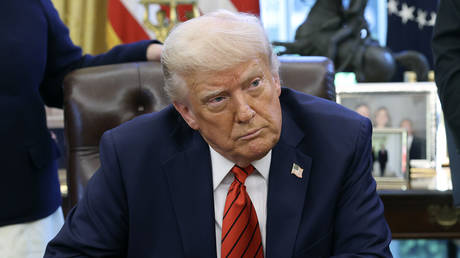 Trump accuses Zelensky of harming peace talks
Trump accuses Zelensky of harming peace talks
Earlier on Wednesday, Trump said in a post on Truth Social that Zelensky holds a weak bargaining position. “The situation for Ukraine is dire – He can have Peace or, he can fight for another three years before losing the whole Country.”
Trump declined to say whether he intends to meet with Zelensky when they are expected to attend the funeral of Pope Francis later this week. “I don’t know if he is going to the funeral or not… I just hope he gets this thing solved,” Trump told reporters.
Asked whether he expects to meet with Putin during a planned visit to Saudi Arabia next month, Trump said it is “possible, but most likely not… I think we’ll meet with him shortly thereafter.”
Read more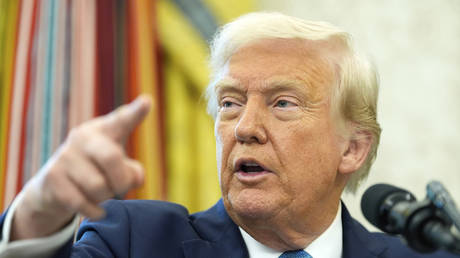 Trump makes ‘final offer’ to end Ukraine conflict – Axios
Trump makes ‘final offer’ to end Ukraine conflict – Axios
The US has been pushing for a resolution to the conflict, while also seeking to secure a minerals extraction agreement with Ukraine to help offset the billions of dollars it has spent supplying weapons and aid.
However, Trump and his administration have grown increasingly frustrated with the slow pace of negotiations on both fronts. Secretary of State Marco Rubio warned on Tuesday that if progress stalls, the US may walk away from the talks. “If not enough movement is happening, we may need to move on to other priorities,” he said.
White House Press Secretary Karoline Leavitt also voiced Trump’s frustration with Zelensky. “Unfortunately, Zelensky has been trying to litigate this peace negotiation in the press, and that’s unacceptable to the president,” Leavitt said on Wednesday.
READ MORE: Expedited Ukraine peace deal unlikely – Moscow
Kremlin spokesman Dmitry Peskov noted that a peace deal with Ukraine is unlikely to be concluded in an expedited manner due to the complexities of the negotiations. Moscow has said it has always been ready to engage in peace talks, provided they ensure a permanent solution that addresses the root causes of the conflict – while a temporary ceasefire would be used by Ukraine’s Western backers to rearm the country’s military.
-
Site: Fr. Z's BlogAs I write, I have returned home from supper with a priest who just arrived in Rome for the canonization of Carlo Acutis… which has been cancelled. Other things are going on. Returning home I find no internet. I’m using … Read More →
-
Site: Rorate CaeliIt’s as if they were just waiting for the perfect moment—the moment when the last obstacle to their plan would be removed, and no one could stop them. The German original may be found here. -PAK “Blessing Gives Strength to Love”:Blessings for couples who love each otherHandout for pastors Resolution of the Whole Conference [of German Bishops], April 4, 2025 [released April 23] “The Church Peter Kwasniewskihttp://www.blogger.com/profile/05136784193150446335noreply@blogger.com
-
Site: AsiaNews.itMore than 1,100 people, mostly female workers, died trapped in the textile garment factory.Wounds remain open due to slowed-down legal processes.But Caritas Bangladesh with its support programmes manages to be close to those who have lost their parents or have been disabled.
-
Site: The Remnant Newspaper - Remnant ArticlesThe majority of these heterodox Cardinals may openly profess certain truths of the Faith, but they routinely deny the logical consequences of those truths. So we have Cardinals such as “Tucho” Fernández, Cupich, McElroy, Tagle, Koch, Zuppi, Grech, and Hollerich (among many others) tell us that there is no need for non-Catholics to convert, and even less need for Catholics to follow Our Lord’s commandments.
-
Site: RT - News
The US president is “frustrated” with the Ukrainian leader, who’s moving in the “wrong direction” on peace talks, Trump’s spokesperson has said
The White House has criticized Vladimir Zelensky for publicly discussing sensitive details of peace negotiations aimed at ending the Ukraine conflict.
On Tuesday, it was reported that Zelensky publicly rejected a US proposal for territorial concessions to Russia, including the recognition of Crimea as Russian territory, as part of a peace deal. According to the media, the move has angered US officials, with Secretary of State Marco Rubio skipping Wednesday’s talks in London with European and Ukrainian delegations.
During a press briefing on Wednesday, White House spokesperson Karoline Leavitt voiced US President Donald Trump’s frustration over Zelensky’s recent comments to the media regarding the talks.
“Unfortunately, President Zelensky has been trying to litigate this peace negotiation in the press, and that’s unacceptable to the president,” Leavitt said.
Leavitt stressed that the Trump administration believes such talks should be handled in private.
Read more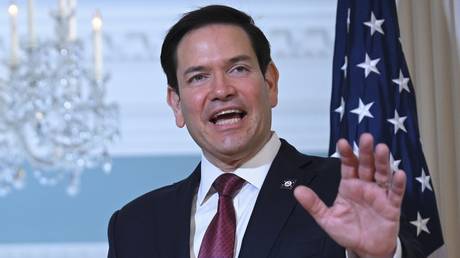 Washington angered by Zelensky’s response to Trump peace plan – WaPo
Washington angered by Zelensky’s response to Trump peace plan – WaPo
“The president’s national security team, his advisors have exuded significant time, energy and effort to try to bring this war to an end,” she stated. “The American taxpayer has funded billions of dollars in this effort and enough is enough.”
The remarks signal growing impatience within Trump’s team over what it sees as an unproductive public discourse surrounding peace efforts. “The president… is frustrated. His patience is running very thin. He wants to do what’s right for the world. He wants to see peace, and unfortunately President Zelensky seems to be moving in the wrong direction,” Leavitt said.
The spokesperson clarified that Trump is not demanding Ukraine recognize Russian sovereignty over Crimea, but is instead calling for realistic dialogue. “What he is asking is for people to come to the negotiating table recognizing that this has been a brutal war for far too long.”
She concluded by emphasizing the need for compromise in any future peace deal. “In order to make a good deal, both sides have to walk away a little bit unhappy,” Leavitt said.
-
Site: AsiaNews.itThe Chaldean Patriarch spoke to AsiaNews about the late pope on the eve of his departure for Rome to attend the pontiff's funeral and the conclave. Francis was a "prophetic" voice that spoke not only to Christians, but to all Iraqis. His historic trip in March 2021 and the message of peace and brotherhood are his legacy. He 'was able to read and grasp the signs of the times better than anyone else.'
-
Site: PaulCraigRoberts.org
Breaking News
According to the Financial Times Russian President Putin Has Signaled His Readiness to Sell Out His Country
Paul Craig Roberts
This morning I wrote that Putin had so badly mishandled the Ukraine conflict that his only choice was surrender or military victory, a victory he has been avoiding for more than three years. If the Financial Times can be believed, Putin has chosen surrender, or perhaps more accurately, partial surrender or semi-surrender.
The Financial Times reports that “Vladimir Putin has offered to halt his invasion of Ukraine at the current front line as part of efforts to reach a peace deal with US President Donald Trump, according to people familiar with the matter.” [The Financial Times continues to display its ignorance or its partisanship by designating Russian military action limited to the Russian territories as an “invasion of Ukraine.” The Financial Times has proven so unreliable in its coverage that I cannot say I have confidence in this report.]
Moreover, the Financial Times reported that Putin told President Trump’s Special Envoy for Ukraine, Steve Witkoff, that Moscow could sweeten the deal by relinquishing Russia’s claims to areas of the four regions currently considered by the Kremlin to be part of Russia. This concession despite Putin himself having introduced constitutional amendments barring Russia from relinquishing claims to any of its territory.
Putin has yet again shown that nothing he says in defense of Russia means anything. All along Putin has said he would not accept any peace deal unless Ukraine withdrew its troops from the front lines and gave Moscow full control over the four provinces. Now suddenly Putin is willing to piss away a military victory and, perhaps, give back battlefield gains of Russian populated areas for a deal. This point is not clear.
The Financial Times says Putin has stepped back from his demands. When you refuse to play your winning cards, what kind of deal can you expect? By showing such desperation for a deal while winning on the battlefield, Putin has further enhanced his reputation as a person irresolute in war. The consequence for Russia will be another disastrous agreement, such as the Minsk Agreement, that will not be kept and that will evolve into worse conflict.
What Trump wants is not a Great Powers Agreement, but a settlement that lets Trump claim success in ending the conflict. Any agreement will not last beyond Trump’s term of office.
Here is the Financial Times report:
Vladimir Putin offers to halt Ukraine invasion along current front line
https://www.ft.com/content/5d848403-4a15-4592-888b-eb7b754ecb3aThis is an amazing Financial Times news report for there not to be anything about it on RT, Sputnik, BBC, CNN, Los Angeles Times.
-
Site: RadTrad Thomist
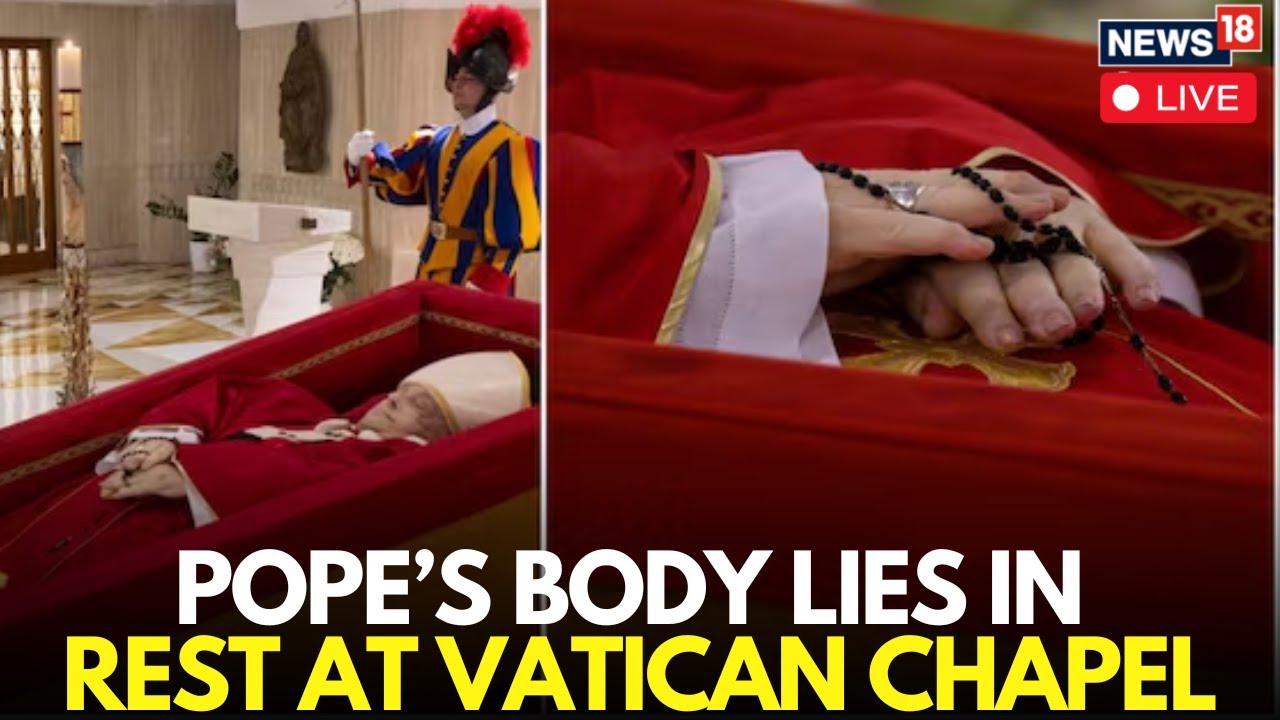 If we did not have the promises of Our Lord Jesus Christ that the Church of Christ would survive to the end of the world and that the Roman See is indefectible, we could reasonably view the traditionalist war for the Catholic Religion as a near complete failure. A man who said publicly that Luther was correct with regard to the question of Justification, that there is no Hell, that God wills all religions and does not just tolerate them, that non-believers should not be converted to the Church --- that being a supreme no-no, that sodomitic "unions" could be blessed, and that divorced and remarried people should not worry about taking "a piece of bread and a little wine," should be looked at with horror by the faithful and, even, by a world that appreciates the Catholic Church's role in the world. But he is not, quite the contrary. It is this man who began, if we except Jose Marie Escriva, to canonize all of the pantheon of Novus Ordo "saints." All of these things, and al of the teachings of his predecessors back to John XXIII, have become part of the milieu, part of the atmosphere of Rome. It is a universalism and worldliness that is the basis for currently praising Francis and for the "hopes" that the Mass Media puts in the election of his successor. It is Man that is now considered to be divine. Just as the Neo-Modernists had always hoped.
If we did not have the promises of Our Lord Jesus Christ that the Church of Christ would survive to the end of the world and that the Roman See is indefectible, we could reasonably view the traditionalist war for the Catholic Religion as a near complete failure. A man who said publicly that Luther was correct with regard to the question of Justification, that there is no Hell, that God wills all religions and does not just tolerate them, that non-believers should not be converted to the Church --- that being a supreme no-no, that sodomitic "unions" could be blessed, and that divorced and remarried people should not worry about taking "a piece of bread and a little wine," should be looked at with horror by the faithful and, even, by a world that appreciates the Catholic Church's role in the world. But he is not, quite the contrary. It is this man who began, if we except Jose Marie Escriva, to canonize all of the pantheon of Novus Ordo "saints." All of these things, and al of the teachings of his predecessors back to John XXIII, have become part of the milieu, part of the atmosphere of Rome. It is a universalism and worldliness that is the basis for currently praising Francis and for the "hopes" that the Mass Media puts in the election of his successor. It is Man that is now considered to be divine. Just as the Neo-Modernists had always hoped. -
Site: Novus Motus LiturgicusFollowing up on Monday’s post about the service known as the Paschal Hour in Byzantine Rite, here is the text of another special rite, which is done after Vespers on Easter day itself. It is brief enough to show the whole of it with just one photograph from the Pentecostarion, the service book which contains all the proper texts of the Easter season. Christ is risen!Gregory DiPippohttp://www.blogger.com/profile/13295638279418781125noreply@blogger.com0
-
Site: Catholic ConclaveOn the eve of a new Conclave, the wave of analysis, pressures, and agendas from outside is inevitable. The mainstream media, which for years have ignored or ridiculed the Church, now rush to set the pace: to talk about politics, sex, power, administration. As if the Conclave were an assembly of technocrats, as if the cardinals were managers of a company that needs to modernize its image.But the Catholic Conclavehttp://www.blogger.com/profile/06227218883606585321noreply@blogger.com0
-
Site: Fr. Z's BlogOver Rome at 06:15 the sun emerged and it will remerge (?) submerge at 20:02. The Ave Maria Bell ought to ring for the Curia at 2-:15 (but it won’t). It’s the feast of St. George and St. Adalbert. It … Read More →
-
Site: AsiaNews.itSome of the pilgrims and onlookers in Rome paying homage to Bergoglio's coffin are from Asia, from Mumbai and Seoul to Hanoi and Shanghai. Believers and non-believers spoke to AsiaNews about their presence in the Vatican to witness this historic moment. 'We are Hindus but [. . .] it was important to be here.' 'He will be remembered by Koreans for a long time.' Unable to see him in Singapore, others are now in Rome as pilgrims.
-
Site: RT - News
While US negotiators trade smiles with Tehran, internal rifts and foreign pressure reveal just how fragile Washington’s position has become
Last Saturday, the second round of US-Iran nuclear talks took place in Rome, following an initial meeting held a week before in Muscat, Oman. Both sides had described the talks as “constructive,” but that optimism quickly collided with a wave of conflicting signals from the Trump administration. Despite the encouraging tone, it remained unclear whether a new nuclear agreement was truly within reach.
At the outset of negotiations, National Security Advisor Mike Waltz – an outspoken Iran hawk – laid down a hardline condition: Iran must completely dismantle its uranium enrichment program if it wanted any deal with the US. But after the Muscat meeting, Special Envoy to the Middle East Steve Witkoff, who led the US delegation, struck a very different note. In an interview with Fox News, he suggested that Tehran might be allowed to maintain limited uranium enrichment for peaceful energy purposes – something that would have been a nonstarter just days earlier.
Witkoff emphasized the importance of strict verification protocols to prevent any militarization of Iran’s nuclear capabilities, including oversight of missile technology and delivery systems. Notably absent from his remarks? Any mention of “dismantlement.” This shift hinted that the administration might be considering a modified return to the 2015 Joint Comprehensive Plan of Action (JCPOA) – the very agreement that Trump tore up in 2018, branding it a “disaster.”
But the pivot didn’t last. Just one day later, Witkoff reversed course in a post on X, doubling down on the demand for full dismantlement of Iran’s nuclear and weapons programs. So what triggered the rhetorical whiplash?
According to Axios, Trump huddled with top national security officials just three days after the Muscat talks to reassess the US strategy. In that meeting, Vice President JD Vance, Witkoff, and Defense Secretary Pete Hegseth argued for a pragmatic approach. Pushing Tehran to dismantle its entire nuclear infrastructure, they warned, would tank the talks. Iran had already made it clear that such sweeping concessions were off the table. Vance even suggested Washington should brace for some level of compromise.
But not everyone agreed. A rival faction – led by Waltz and Secretary of State Marco Rubio – saw things differently. They argued that Iran’s current vulnerability gave the US a unique upper hand, one that shouldn’t be squandered. If Tehran failed to meet America’s terms, they insisted, the US should be ready to strike militarily or greenlight Israeli action.
Read more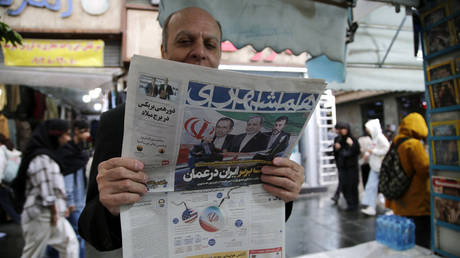 US and Iran talk again. Is war really off the table?
US and Iran talk again. Is war really off the table?
The divide exposes a deeper strategic rift within the Trump administration. Between the maximalist view that Iran must be completely disarmed and the more flexible position that aims to curb weaponization while preserving peaceful enrichment lies a vast gray area. The lack of a unified message – or even basic consensus – risks leaving the US at a disadvantage against a seasoned and coordinated Iranian negotiating team.
In short, Trump finds himself in a difficult balancing act. On one hand, it’s clear he wants to avoid military escalation. The decision to send Witkoff – a figure known for his willingness to compromise – signals a genuine interest in diplomacy over saber-rattling. If hardliners had the upper hand in Washington, it’s unlikely the second round in Rome would have happened at all.
On Monday, April 21, Trump cautiously told reporters the talks were going “very well,” but warned that real progress would take time. His choice of words reflected a desire to stay flexible, while acknowledging the complexity – and risks – of negotiating with Tehran.
Optimism seems more palpable on the Iranian side. Foreign Minister Abbas Araghchi said the two sides had found significantly more common ground in Rome than in Muscat. His remarks suggest that momentum is building and that real progress may be on the horizon.
Araghchi’s itinerary also raised eyebrows. Before heading to Rome, he made a stop in Moscow, where he met with President Vladimir Putin and Foreign Minister Sergey Lavrov. He reportedly carried a personal message from Supreme Leader Ayatollah Ali Khamenei – what he called “a message to the world.” The West didn’t miss the symbolism: the visit was widely interpreted as a public reaffirmation of the Moscow–Tehran alliance. Retired US Army Colonel and former Pentagon advisor Douglas MacGregor noted on X that any major American military action against Iran would likely draw a response from Russia, Tehran’s strategic partner.
On that same day, President Putin signed a law ratifying a Comprehensive Strategic Partnership with Iran – further cementing political and economic cooperation. Against the backdrop of fragile US-Iran talks, the Moscow-Tehran axis suddenly looks more consequential. With these growing ties, Washington may find it harder to exert unilateral pressure on Iran.
Read more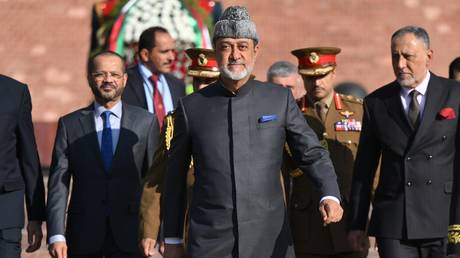 Somehow, this country is a friend to the US, Iran and Russia – and it’s working
Somehow, this country is a friend to the US, Iran and Russia – and it’s working
Meanwhile, not everyone in Tehran is sold on the negotiations. Many Iranian officials remain skeptical of Trump, whose decision to unilaterally scrap the JCPOA in 2018 still looms large. Their distrust extends beyond Trump himself to a broader concern: that future US presidents may once again reverse course. If Obama’s deals were dismantled by Trump, why wouldn’t Trump’s agreements suffer the same fate?
Despite these tensions, major international outlets have confirmed that two more rounds of talks are planned: one in Geneva next week, and another in Oman the week after. The continued diplomatic activity points to a shared interest in keeping the conversation alive. For now, both Trump’s measured optimism and Iran’s cautious tone suggest that, at least in the near term, the risk of war has receded.
This de-escalation in rhetoric reflects a deeper truth: despite lingering mistrust and domestic political pressures, both sides see value in staying at the table. You don’t have to be a policy wonk to see that. But in Israel, the mood is far more anxious. Prime Minister Benjamin Netanyahu – never one to hide his skepticism about engaging Iran – has condemned the talks. For Tel Aviv, negotiations risk softening Tehran’s isolation and threatening Israel’s strategic position.
Still, Trump’s priority isn’t regional politics – it’s his legacy. He wants to be seen as the president who avoided war and brokered a deal the American public can get behind. In that light, Netanyahu’s objections may have to wait.
-
Site: Catholic ConclaveThe Pope has barely died and names for his successor are already circulating. One of them is from Ghana: Cardinal Peter Turkson. But he is attracting criticism.After the death of Pope Francis, the Church is following a precise procedure. The conclave to determine the successor to the Holy See is expected to convene in early May, according to the German Press Agency. The cardinals must begin Catholic Conclavehttp://www.blogger.com/profile/06227218883606585321noreply@blogger.com0
-
Site: RT - News
Federal employees have reportedly been asked to report instances of such discrimination among colleagues
The White House has launched a task force to investigate the alleged anti-Christian bias within federal agencies, directing employees to report perceived discrimination against Christians among their colleagues, according to media reports.
US President Donald Trump mandated the creation of what is called the Task Force to Eradicate Anti-Christian Bias in an executive order in February. The task force is meant to identify policies and actions across federal departments that have unlawfully discriminated against Christians, according to the document.
“The Biden administration engaged in an egregious pattern of targeting peaceful Christians while ignoring violent anti-Christian offenses,” Attorney General Pam Bondi said at the task force’s inaugural meeting on Tuesday.
Christians under the administration of Joe Biden were subjected to abuse and spying from federal agencies, she claimed.
The task force will identify “unlawful anti-Christian policies, practices or conduct across the government,” as well as “find and fix deficiencies in existing and regulatory practices,” Bondi said.
Read more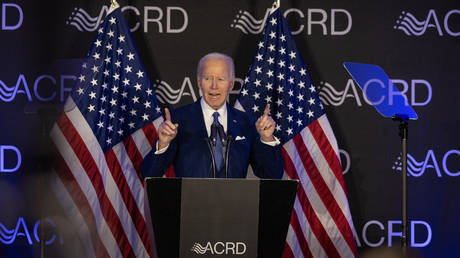 Democrats issue warning to Biden – The Hill
Democrats issue warning to Biden – The Hill
Federal employees have reportedly received instructions to report instances of this kind of discrimination among their colleagues.
The Department of Veterans Affairs (VA) has requested that their workers relay instances of “anti-Christian” bias, complete with names, dates and locations to a government email address, The Guardian wrote on Tuesday, citing an internal email from the body.
A similar internal memo was circulated among US State Department staff, Politico reported earlier this month.
Read more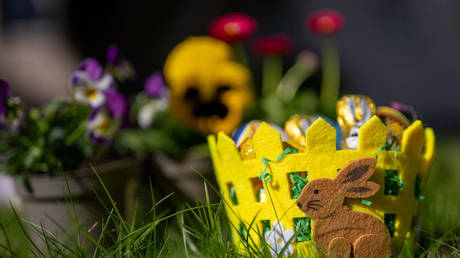 Kiev opens LGBT film festival on Good Friday
Kiev opens LGBT film festival on Good Friday
Several senior members of Trump’s administration are devout Christians, including Vice President J.D. Vance and Defense Secretary Pete Hegseth. A large share of white American Christians supported Trump's presidential bid, according to a Pew Research study from last year.
The US president himself was raised Presbyterian, but announced himself a non-denominational Christian in 2020. After surviving an assassination attempt, and having several plots on his life foiled during his 2024 reelection campaign, Trump has repeatedly said that God spared his life.
The majority of Americans, 62%, identify as Christian, while around 30% are non-religious, and 7% belong to non-Christian religions, according to a Pew Research study from February.
-
Site: Catholic Conclave"Old, unrealistic man"Cologne Cardinal Woelki allegedly attacked good name of Pope FrancisThe relationship between the late Pope Francis and Cologne Cardinal Rainer Woelki was considered strained at times.Following the death of Pope Francis, Cardinal Rainer Woelki revealed the final state of their not always unstrained relationship. Asked in the ARD and ZDF "Morgenmagazin" program whether Catholic Conclavehttp://www.blogger.com/profile/06227218883606585321noreply@blogger.com0
-
Site: RadTrad Thomist
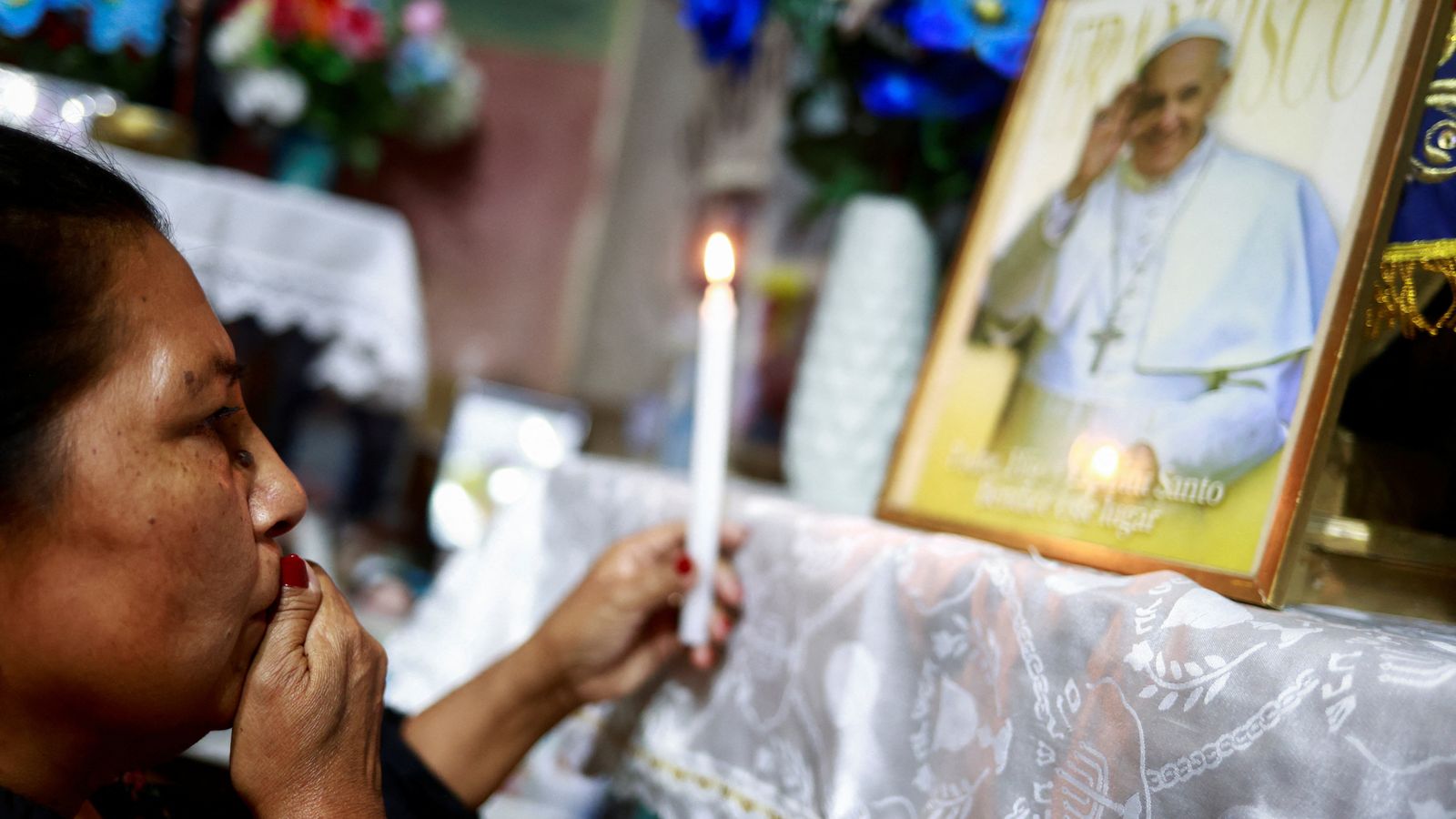
I will keep my blog posts short on account of the terrible internet connection in the place that I am staying in in Rome. There are huge crowds here, crowds the size of which I have never seen before, even though I have been to Rome many times in the past. People are waiting for hours to get into St. Peter's to view the body. In front of St. Mary Major, where Francis has asked to be buried, they are already setting up chairs outside of the church, these are for those who are saying the rosary tonight outside of the church, but I can imagine that they will be still set up for dignitaries, some of whom will be seated outside the church of burial. Such is the situation in Rome on the Wednesday before the funeral. We saw a parade of cardinals, all dressed in bright red cassocks and birettas, almost parading down the street. My pictures of all of these sightings will be put up on X.com. What is strange here is that there really are no signs of mourning here, in the streets. In fact, people seem generally in a elated and party-like mood. No one really seems sad, at least externally. Not at all. I found myself weeping when I heard the bells of Mary Major ring out 88 times for the 88 years of Francis's life. The human heart is a complicated thing.
-
Site: AsiaNews.itThe 12 years of Francis's pontificate were marked by 13 trips in Asia, from the first visit to South Korea to the long journey last September to Indonesia, Papua New Guinea, Timor-Leste, and Singapore. During this time, his message of peace and hope strengthened the ties between the Church and various Asian cultures.
-
Site: RT - News
Steve Witkoff is expected to meet the Russian president on Friday, Axios reports
A meeting between Russian President Vladimir Putin and US President Donald Trump’s special envoy, Steve Witkoff, could happen on Friday, Axios reported on Wednesday, citing an unnamed US official.
Earlier, Moscow confirmed that Witkoff would travel to Russia later this week.
Witkoff has visited Russia three times in recent months for multiple rounds of talks with senior Russian officials, including Putin, as part of peace efforts undertaken by Washington and Moscow to end the Ukraine conflict.
As part of a potential peace deal, Washington reportedly proposes to recognize Russia’s jurisdiction over Crimea and acknowledge Moscow’s control over four other former Ukrainian regions that voted to join Russia. The plan is also said to include the scheduled lifting of some sanctions against Russia and a denial to Ukraine's request to join NATO.
On Tuesday, Vladimir Zelensky rejected any discussion of recognizing Crimea as Russian, prompting Trump to warn on Wednesday that Zelensky risked losing his entire country if he continued to undermine the talks.
READ MORE: Trump accuses Zelensky of harming peace talks
Witkoff, together with US Secretary of State Marco Rubio, skipped a high-level meeting on Ukraine in London on Wednesday, following Zelensky's rebuttal of a key pillar in the US peace proposal.
The UK Foreign Office later confirmed to AFP that a meeting of foreign ministers from countries backing Kiev had been indefinitely postponed, adding that “official level talks” will continue but behind closed doors.
-
Site: southern orders
Crux has a thorough article of Pope Francis' papal debacles. Press the title for the complete article from Crux:Looking back on Francis legacy, top 6 papal controversies
I. Political Advocacy
II. Amoris Laetitia
III. Amazon Synod/“Pachamama”
IV. Traditional Latin Mass
V. Fiducia Supplicans
VI.Frociaggine/Faggotry
-
Site: The Remnant Newspaper
-
Site: Henrymakow.com
 Please send comments and urls to hmakow@gmail.comI nominate Archbishop Vigano as the next Pope.E. Michael Jones if Vigano is not available.Archbishop Vigano: Bergoglio will answer to God for usurping the throne of PeterHis soul has not disappeared. He will have to account for the crimes he has committed."But if this non-pope and anti-pope can no longer harm the Mystical Body, his heirs still remain, the subversives whom he has invalidly created "cardinals" and who have long been organizing themselves to ensure a continuator of the synodal revolution and the destructuring of the Papacy. In support of them are also the conservative Cardinals and Bishops who have been careful not to question the legitimacy of Jorge Bergoglio. It is on these people that the greatest responsibility for the outcome of the next "conclave" falls."Satanic Freemasonic lodge hails Pope Francis' work as 'deeply resonant' with their 'principles'He was a FreemasonPapal arch enemy Archbishop Vigano found guilty of schism and excommunicatedVATICAN CITY, July 5 (Reuters) - Italian Archbishop Carlo Maria Vigano, a fierce ultra-conservative critic of Pope Francis, has been found guilty of schism and excommunicated, the Vatican's doctrinal office said on Friday.Vigano, the papal envoy in Washington from 2011-2016, went into hiding in 2018 after alleging that the pope knew for years about sexual misconduct by U.S. Cardinal Theodore McCarrick and did nothing about it.-
Please send comments and urls to hmakow@gmail.comI nominate Archbishop Vigano as the next Pope.E. Michael Jones if Vigano is not available.Archbishop Vigano: Bergoglio will answer to God for usurping the throne of PeterHis soul has not disappeared. He will have to account for the crimes he has committed."But if this non-pope and anti-pope can no longer harm the Mystical Body, his heirs still remain, the subversives whom he has invalidly created "cardinals" and who have long been organizing themselves to ensure a continuator of the synodal revolution and the destructuring of the Papacy. In support of them are also the conservative Cardinals and Bishops who have been careful not to question the legitimacy of Jorge Bergoglio. It is on these people that the greatest responsibility for the outcome of the next "conclave" falls."Satanic Freemasonic lodge hails Pope Francis' work as 'deeply resonant' with their 'principles'He was a FreemasonPapal arch enemy Archbishop Vigano found guilty of schism and excommunicatedVATICAN CITY, July 5 (Reuters) - Italian Archbishop Carlo Maria Vigano, a fierce ultra-conservative critic of Pope Francis, has been found guilty of schism and excommunicated, the Vatican's doctrinal office said on Friday.Vigano, the papal envoy in Washington from 2011-2016, went into hiding in 2018 after alleging that the pope knew for years about sexual misconduct by U.S. Cardinal Theodore McCarrick and did nothing about it.- Chinese Tik Toker says the US has only itself to blame. China reinvested its profits in infrastructure. US oligarchs shipped jobs abroad to profit from cheap labor. "You don't need tariffs. You need a revolution!""You let oligarchs feed you lies while they made you fat, poor, and addicted."-----Ex Shin Bet Chief Amos Harel Paints a Damning Picture of Netanyahu, Hellbent on Dismantling Democracy"Prime Minister Benjamin Netanyahu has launched a war to dismantle Israeli democracy. He wants to turn the intelligence services into a kind of secret police, a Stasi or Securitate on the Eastern European model. He expects this secret police to obey him alone, serve his personal objectives, track protest movements against him and respond to his orders even in the event of a constitutional crisis and direct confrontation with the Supreme Court. "-"Tonight we cooked water and milk to satisfy our hunger. The price of a kilo of milk is $36. We bought it thanks to your donations. Thank you always."A Way to Help Gaza-The Kabbalistic Doomday Death Cult w/ Christopher Jon BjerknesDiscusses the real nature of Judaism, kabbalistic sorcery, and the kabbalistic plan.-
Chinese Tik Toker says the US has only itself to blame. China reinvested its profits in infrastructure. US oligarchs shipped jobs abroad to profit from cheap labor. "You don't need tariffs. You need a revolution!""You let oligarchs feed you lies while they made you fat, poor, and addicted."-----Ex Shin Bet Chief Amos Harel Paints a Damning Picture of Netanyahu, Hellbent on Dismantling Democracy"Prime Minister Benjamin Netanyahu has launched a war to dismantle Israeli democracy. He wants to turn the intelligence services into a kind of secret police, a Stasi or Securitate on the Eastern European model. He expects this secret police to obey him alone, serve his personal objectives, track protest movements against him and respond to his orders even in the event of a constitutional crisis and direct confrontation with the Supreme Court. "-"Tonight we cooked water and milk to satisfy our hunger. The price of a kilo of milk is $36. We bought it thanks to your donations. Thank you always."A Way to Help Gaza-The Kabbalistic Doomday Death Cult w/ Christopher Jon BjerknesDiscusses the real nature of Judaism, kabbalistic sorcery, and the kabbalistic plan.-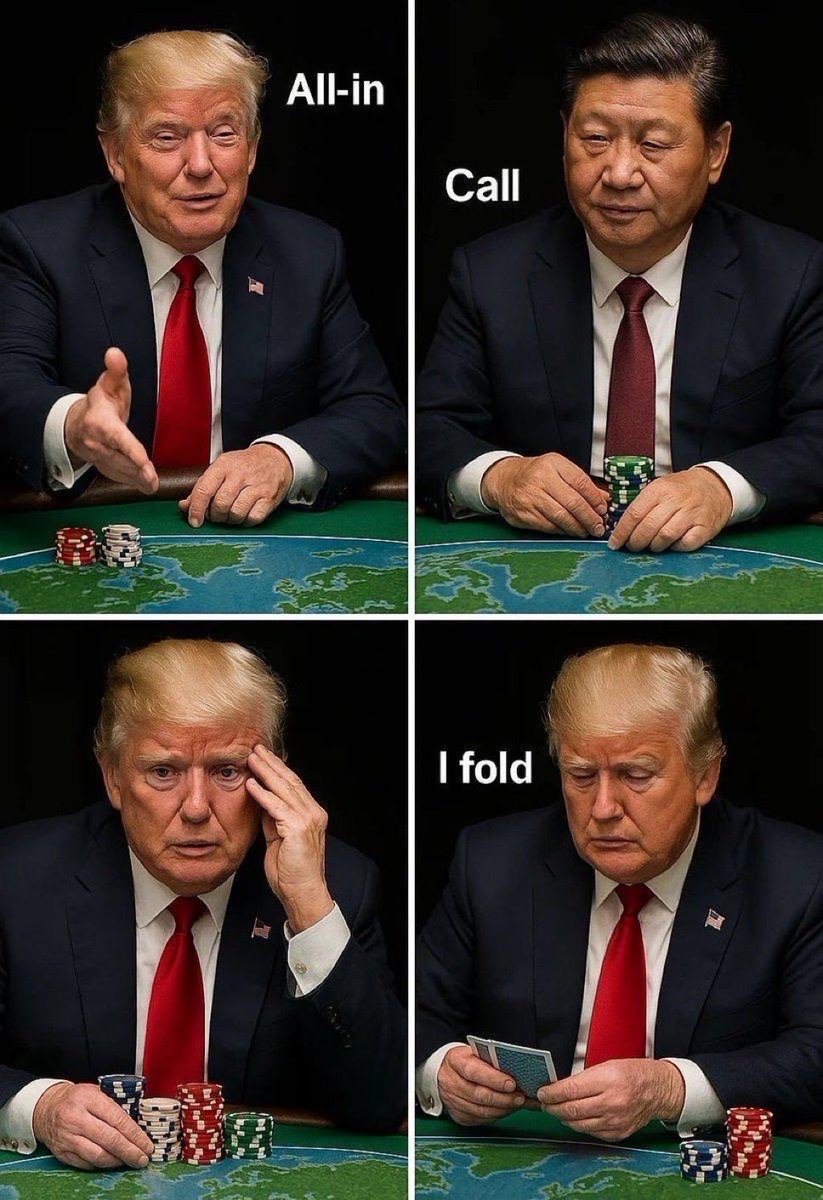 China unimpressed by Trump who is caving on tariffs. Zionist intimidation tactics work on Gaza children but not on a superpower more advanced than the US.Lena Petrova---BRICS is Rising: BRICS Leads the Global Power Shift as It Builds a New World Order Without the West | Dr. Yaroslav Lissovolik"The BRICS+ alliance, under the chairmanship of Brazil, held a conference, "The Dilemmas of Humanity," in Sao Paulo, where the bloc's members and partners discussed approaches to countering the tariff regime imposed by the Trump administration, a new financial architecture, and enhancing platforms to promote South-South cooperation."---AfD Is Now the Most Popular Party in Germany and the Reason Why Is Very SimpleThe incoming chancellor Merz has *already* betrayed his votersMakow- It's only "far right" if you're far Left.Communists marginalize people defending freedom and country by slandering them.Ultimately Communism is a satanic criminal conspiracy to steal everything from everyone.-3 Decades Wiped from Life Expectancy of Covid-VaxxedShockwaves have been sent rippling through the scientific community after a study found that around 30 years have been wiped from the average life expectancy of people who received at least two doses of Covid mRNA "vaccines."The alarming study found that the mRNA injections reduce a person's lifespan by a whopping 37%.-
China unimpressed by Trump who is caving on tariffs. Zionist intimidation tactics work on Gaza children but not on a superpower more advanced than the US.Lena Petrova---BRICS is Rising: BRICS Leads the Global Power Shift as It Builds a New World Order Without the West | Dr. Yaroslav Lissovolik"The BRICS+ alliance, under the chairmanship of Brazil, held a conference, "The Dilemmas of Humanity," in Sao Paulo, where the bloc's members and partners discussed approaches to countering the tariff regime imposed by the Trump administration, a new financial architecture, and enhancing platforms to promote South-South cooperation."---AfD Is Now the Most Popular Party in Germany and the Reason Why Is Very SimpleThe incoming chancellor Merz has *already* betrayed his votersMakow- It's only "far right" if you're far Left.Communists marginalize people defending freedom and country by slandering them.Ultimately Communism is a satanic criminal conspiracy to steal everything from everyone.-3 Decades Wiped from Life Expectancy of Covid-VaxxedShockwaves have been sent rippling through the scientific community after a study found that around 30 years have been wiped from the average life expectancy of people who received at least two doses of Covid mRNA "vaccines."The alarming study found that the mRNA injections reduce a person's lifespan by a whopping 37%.- The Roundup (Glyphosate) Toxin Scam and Conspiracy"The use of Roundup and its active agent, glyphosate, became the perfect Crime Syndicate scam during the last 25 years. Roundup is now routinely sprayed directly on a host of GMO crops, including wheat, barley, oats, canola, flax, peas, lentils, soybeans, dry beans and sugar cane."--Drugged Into Oblivion: More Than 60% Of US Adults Admit That They Are Taking Pharmaceutical DrugsAnd once they have you on one drug, they are much more likely to be able to get you on another. The KFF survey found that 13 percent of U.S. adults are taking one pharmaceutical drug.The KFF survey found that 11 percent of U.S. adults are taking two pharmaceutical drugs. The KFF survey found that 10 percent of U.S. adults are taking three pharmaceutical drugs. And most shocking of all, the KFF survey found that 27 percent of U.S. adults are taking at least four pharmaceutical drugs.-
The Roundup (Glyphosate) Toxin Scam and Conspiracy"The use of Roundup and its active agent, glyphosate, became the perfect Crime Syndicate scam during the last 25 years. Roundup is now routinely sprayed directly on a host of GMO crops, including wheat, barley, oats, canola, flax, peas, lentils, soybeans, dry beans and sugar cane."--Drugged Into Oblivion: More Than 60% Of US Adults Admit That They Are Taking Pharmaceutical DrugsAnd once they have you on one drug, they are much more likely to be able to get you on another. The KFF survey found that 13 percent of U.S. adults are taking one pharmaceutical drug.The KFF survey found that 11 percent of U.S. adults are taking two pharmaceutical drugs. The KFF survey found that 10 percent of U.S. adults are taking three pharmaceutical drugs. And most shocking of all, the KFF survey found that 27 percent of U.S. adults are taking at least four pharmaceutical drugs.-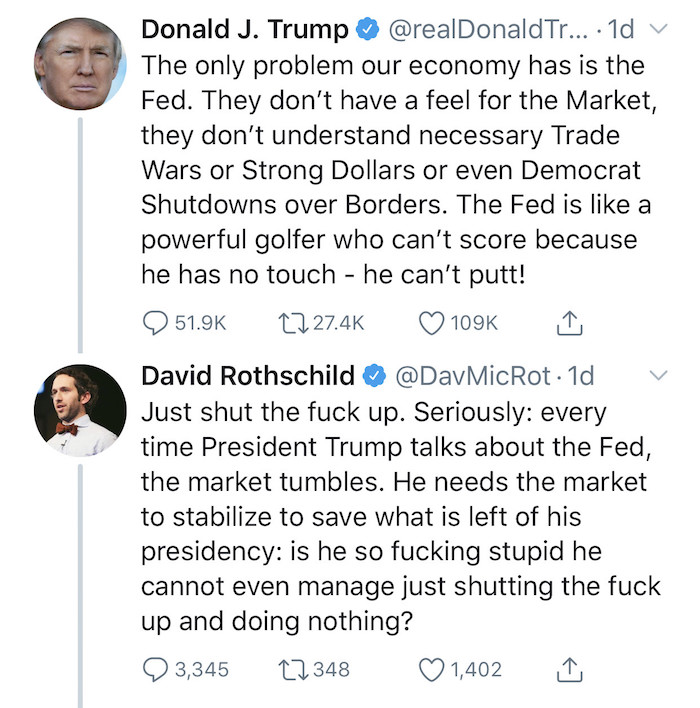 DJT's opposition to Fed is an act.Jan 3 2019- David Rothschild Tells Trump to "Shut The F* Up" About Reforming Their Federal Reserve BankNote from Mike Zint: "Don't blame a religion for the actions of a few. The Fed is constitutionally illegal, and is the only reason we pay income tax -- to pay the interest on the debt to these bankers to issue our own money. That's why Rothschild is really worried about Trump's comments."-PJW--Blocking out sunlight to stop climate change. What could possibly go wrong?-Conspiracy Reddit reader hasn't recovered from the Plandemic"I still don't know how to live normally after what I saw during the "pandemic"I've been carrying this weight for a while, and I just need to let it out somewhere people might understand.If even 10% of what we've learned about the harmful effects of the "vaccines" is true... then this wasn't just a mishandled crisis. It was something else. Something planned. A kind of soft genocide, quietly carried out while people clapped and shamed each other into compliance. And the worst part? So many leaders, across so many nations, were at least somewhat in on it -- whether actively or by turning a blind eye.That realization has broken something in me. It's not just anger or betrayal. It's a deep sadness -- for the people who were hurt, for those who still don't see it, and for the world I thought I lived in. I feel like I'm grieving something invisible. My sense of reality. My trust. My sense of safety.I don't know how to move on from this. I don't know how to pretend things are fine when they're not. I try to live a normal life, but there's always this weight in the back of my mind -- a sense that nothing is what it seems anymore.If anyone else is going through this, how do you cope? How do you rebuild yourself after something like this? I don't want to argue or convince anyone. I just want to feel less alone."--The Choice- Zionist or Communist tyrannyUnder new guidelines released by the National Institute of Health, any medical researchers will have all funds terminated if they support a boycott of Israel.
DJT's opposition to Fed is an act.Jan 3 2019- David Rothschild Tells Trump to "Shut The F* Up" About Reforming Their Federal Reserve BankNote from Mike Zint: "Don't blame a religion for the actions of a few. The Fed is constitutionally illegal, and is the only reason we pay income tax -- to pay the interest on the debt to these bankers to issue our own money. That's why Rothschild is really worried about Trump's comments."-PJW--Blocking out sunlight to stop climate change. What could possibly go wrong?-Conspiracy Reddit reader hasn't recovered from the Plandemic"I still don't know how to live normally after what I saw during the "pandemic"I've been carrying this weight for a while, and I just need to let it out somewhere people might understand.If even 10% of what we've learned about the harmful effects of the "vaccines" is true... then this wasn't just a mishandled crisis. It was something else. Something planned. A kind of soft genocide, quietly carried out while people clapped and shamed each other into compliance. And the worst part? So many leaders, across so many nations, were at least somewhat in on it -- whether actively or by turning a blind eye.That realization has broken something in me. It's not just anger or betrayal. It's a deep sadness -- for the people who were hurt, for those who still don't see it, and for the world I thought I lived in. I feel like I'm grieving something invisible. My sense of reality. My trust. My sense of safety.I don't know how to move on from this. I don't know how to pretend things are fine when they're not. I try to live a normal life, but there's always this weight in the back of my mind -- a sense that nothing is what it seems anymore.If anyone else is going through this, how do you cope? How do you rebuild yourself after something like this? I don't want to argue or convince anyone. I just want to feel less alone."--The Choice- Zionist or Communist tyrannyUnder new guidelines released by the National Institute of Health, any medical researchers will have all funds terminated if they support a boycott of Israel. -
Site: Mundabor's blogOne of the (many) things about Catholicism that make me angry is the fake pious, unbearably sanctimonious, oh so demure self-deprecation of those who say that whilst Francis was, God knows, not an angel, we have all contributed to the divisions in the Church by being so antagonistic to him. One who reads such rubbish […]
-
Site: Voice of the Family
At 7:35 on Easter Monday, 21 April 2025, the soul of Jorge Mario separated from his mortal body to present itself for Divine Judgement. Only on the day of the Universal Judgement will we know what sentence Pope Francis has been given by the Supreme Tribunal at which each of us must one day present […]
The post The death of Pope Francis (2013–2025): end of an era? appeared first on Voice of the Family.
-
Site: Voice of the Family
Elections are in the forefront of many minds at the moment. The people of Canada will soon go to the polls and the Cardinals of the Holy Roman Church are gathering at St Peter’s for the obsequies of Pope Francis and the election of his successor. At first glance it may seem as if these […]
The post Conscientious responsibilities and frightful consequences appeared first on Voice of the Family.
-
Site: Voice of the Family
“If we receive the testimony of men, the testimony of God is greater.” Since last Sunday, we have been celebrating the Resurrection of our Lord from the dead. On Low Sunday, we can think about another resurrection — one that’s still to come, and of which Christ’s Resurrection is the guarantee — I mean, our […]
The post The general resurrection: sermon on Low Sunday appeared first on Voice of the Family.
-
Site: Mises InstitutePresident Trump‘s threat to withhold $9 billion from Harvard University is being framed in the legacy media and academia as a threat to Harvard‘s academic freedom. But there is a pertinent question no pundits are even asking: Why are taxpayers being forced to give Harvard $9 billion?
-
Site: RT - News
The recent series of talks between Washington and Moscow has helped clarify the Kremlin’s position, the US secretary of state has said
Washington has gained a much better understanding of Russia’s position on the Ukraine conflict, now that it has engaged with Moscow after three years of diplomatic refusal, US Secretary of State Marco Rubio has said.
Rubio made the remarks on Wednesday in an interview with The Free Press, saying the US has been seeking to grasp what the Russian position is.
“We have a better understanding of that now because we’ve actually spoken to them after three years of not speaking to them,” he stated.
Ties between Moscow and Washington all but collapsed following the 2022 escalation of the Ukraine conflict under then-President Joe Biden. Since returning to the White House in January, President Donald Trump has distanced himself from Biden-era policies, pushing for a rapid resolution to the conflict and a reset in bilateral relations. The two sides have held several rounds of high-level talks in recent months.
Voicing hope for a peace deal, Rubio emphasized there’s “no military end” to the ongoing hostilities.
Read more Trump accuses Zelensky of harming peace talks
Trump accuses Zelensky of harming peace talks
“We have to be frank. Russia’s not just going to roll over Ukraine and take the whole country. And Ukraine’s not going to push them all the way back to where they were before 2014,” he stated.
“We’ve done our best,” Rubio told the outlet. “This is not our war. We didn’t start this war. We’re trying to help everybody end it,” he said, expressing hope to “bring the two sides closer.”
Rubio was expected at a high-level Ukraine meeting in London on Wednesday with UK, US, French, German and Ukrainian diplomats. However, later Rubio and Trump’s special envoy Steve Witkoff decided to skip the event. The UK Foreign Office later confirmed to AFP that the foreign ministers meeting had been indefinitely postponed, adding that “official level talks” will continue but behind closed doors.
As part of a reported “final offer” to end the Ukraine conflict, Washington had planned to present a proposal in London recognizing Crimea as Russian “de jure” and acknowledging Moscow’s control over the Lugansk and Donetsk People’s Republics, as well as Kherson and Zaporozhye Regions. The plan was also said to include the lifting of some sanctions against Russia and opposing NATO membership for Ukraine.
On Tuesday, Vladimir Zelensky rejected any discussion of recognizing Crimea as Russian. Trump warned on Wednesday that Zelensky risked losing the entire country if he continued to stall talks.
Moscow has maintained that the status of Crimea – which joined Russia in 2014 following a referendum held after the Western-backed coup in Kiev – and the four other former Ukrainian regions that voted to join Russia in 2022, is not up for negotiation. Russian officials also insist that any peace agreement must address the “root causes” of the conflict. President Vladimir Putin has also said that a viable ceasefire would require Western nations to stop arms deliveries to Ukraine.
-
Site: The Remnant Newspaper
-
Site: RT - News
The Ukrainian leader’s refusal to discuss territorial concessions is prolonging the conflict, the US president has said
Ukraine’s Vladimir Zelensky could lose the entirety of his country if he continues stalling talks with Russia, US President Donald Trump warned in a post on Truth Social on Wednesday.
Zelensky had publicly announced that Kiev will not even discuss officially recognizing the Crimean Peninsula as Russian, a key tenet of a Washington-backed peace proposal which it was to present at a meeting with officials the country's European backers on Wednesday. Following the rebuttal the top members of the US delegation withdrew from the planned talks, leading to the meeting being “downgraded” at the last minute.
“This statement is very harmful to the Peace Negotiations with Russia in that Crimea was lost years ago,” Trump wrote, accusing the Ukrainian leader of prolonging the conflict.
READ MORE: White House accuses Zelensky of megaphone diplomacy
Crimea’s predominantly ethnic-Russian population voted to join Russia in a referendum in 2014, following a Western-backed armed coup in Kiev. Trump took to his Truth Social platform on Wednesday, declaring
The situation for Ukraine is dire – He can have Peace or, he can fight for another three years before losing the whole Country.
Trump reiterated that Zelensky has a weak bargaining position in the negotiations. “We are very close to a Deal, but the man with ‘no cards to play’ should now, finally, GET IT DONE,” he wrote.
Read more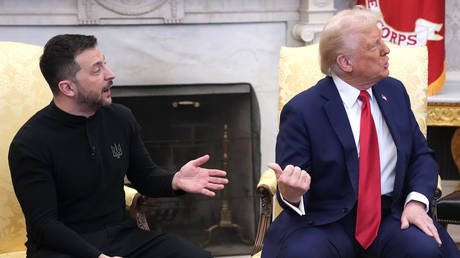 Putin ‘easier to deal with’ than Zelensky – Trump
Putin ‘easier to deal with’ than Zelensky – Trump
The US has been pushing for a resolution to the conflict, while at the same time trying to secure a minerals extraction deal with Ukraine to recoup some of the billions of dollars spent on arming the country. However, Trump and his administration have been growing impatient with the pace of the negotiations on both fronts, signaling that they may abandon the efforts.
If the US determines that “not enough movement is happening, we may need to move on to other priorities,” Secretary of State Marco Rubio said in an interview with the Free Press published on Tuesday.
Kremlin spokesman Dmitry Peskov stated in response that a peace deal with Ukraine is unlikely to be concluded in an expedited manner due to the complexities of the negotiations. Moscow has said it has always been ready to engage in peace talks, provided they ensure a permanent solution that addresses the root causes of the conflict – while any temporary ceasefire would be used by Ukraine’s Western backers to rearm the country’s military.
-
Site: RT - News
Slovakia’s Robert Fico has pointed to a recent study showing the presence of DNA and other undeclared substances in jabs supplied to the country
Slovak Prime Minister Robert Fico has called for an immediate halt to government purchases of Covid-19 vaccines, citing a recent report that found mRNA jabs contain extremely high levels of DNA and substances that were not disclosed by the manufacturer.
Bratislava initially considered outright banning the vaccines when a commission led by Peter Kotlar, an orthopedic doctor and member of the ruling Slovak National Party, published a report in October claiming that the mRNA jabs alter human DNA, have been inadequately tested, and therefore should not be administered until they are proven safe.
Kotlar has also described the Covid-19 pandemic as an “act of bioterrorism” and a “fabricated operation,” and has accused vaccine manufacturers Moderna and Pfizer of turning vaccinated people into “genetically modified organisms.”
His report, however, was met with significant pushback from opposition parties, as well as former Slovak Health Minister Zuzana Dolinkova, who cast doubt on Kotlar’s qualifications with regard to the subject. She subsequently resigned from her position that same month, citing government backing for an anti-vaxxer and insufficient prioritization of health care.
In a post on X on Wednesday, Fico published a video in which he stated that ignoring the findings of the Kotlar-led commission on the quality of the Covid-19 vaccines would be “extremely irresponsible.”
Fico noted that in March, he instructed the Health Ministry to establish a working group to address the findings of the expert report submitted by Kotlar, but acknowledged that this may not produce results quickly enough.
Read more Next pandemic could strike ‘tomorrow’ – WHO
Next pandemic could strike ‘tomorrow’ – WHO
The prime minister said he would try to resolve the issue in “a reasonable timeframe” and propose during an upcoming government meeting that apart from the working group, the Slovak Academy of Sciences (SAV) would also be asked to conduct a quantitative analysis of the presence of DNA and other substances in the vaccines.
Fico also suggested that the government should inform the population about the “serious findings” regarding the jabs. “Although Covid-19 vaccination rates are extremely low, people deserve such a warning,” he said.
The prime minister went on to propose that Slovakia suspend the purchase of additional vaccines from the unspecified manufacturer, which it is obligated to do under a contract signed by the former government in 2023.
Bratislava is still expected to procure nearly 300,000 doses of Covid-19 vaccines in 2025 and 2026, which is estimated to cost around $6.6 million, Fico said, stressing that “until the results of the additional quantitative analysis are delivered, the government should not procure further vaccines from this manufacturer or pay for them.”
-
Site: RT - News
A group of retired officers, including over two dozen generals, has urged Parliament to debate troop presence and lethal aid for Kiev
A group of high-ranking French veterans has called for increased oversight of the country’s military involvement in Ukraine.
In a letter sent to the heads of both houses of Parliament, the former officers urged lawmakers to hold a formal debate on weapons supplies and the continued presence of French troops bolstering Kiev’s war efforts.
The letter, titled the ‘Citizen Resolution’, was published earlier this week on Place d’Armes, a platform for current and former service members to express views on national policy. It included a public call for citizens to sign the resolution in support.
The authors argued that France’s military involvement in Ukraine without a parliamentary mandate, and arms deliveries without public debate, violate the French Constitution and Criminal Code. They claimed that no clear communication has been made to Parliament about the possible presence of French troops in Ukraine since 2022, despite the legal obligation to inform lawmakers of any “military intervention.”
The letter has urged the parliament to publish “all information” about troop presence in the Journal Officiel, the country’s official gazette, and to “organize a debate with a vote on the continuation of this intervention” within 15 days of receiving the letter.
Read more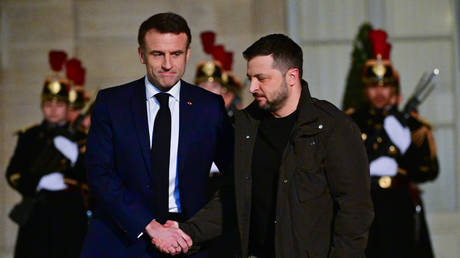 Macron and Zelensky sign military deal
Macron and Zelensky sign military deal
The document also noted that the French-Ukrainian security pact signed last year – which included €3 billion in aid and multi-year military support – has not been ratified by Parliament, despite the Constitution requiring such ratification for treaties having major financial implications for the state.
“The lack of regular parliamentary ratification raises the question of the legality of the supply of weapons from the French army reserves to Ukraine for use against Russia, with which our country is not at war,” the letter states.
The letter also highlighted President Emmanuel Macron’s recent remarks about potentially deploying troops to Ukraine and sharing nuclear capabilities with European partners. The authors argued that such decisions require parliamentary debate to ensure legitimacy.
Commenting on the letter, the head of the Place d’Armes association, Jean-Pierre Fabre-Bernadac, told Sud Radio it reflects heightened public concern about the country’s involvement in Ukraine.
Read more France and UK rebrand possible military deployment to Ukraine
France and UK rebrand possible military deployment to Ukraine
“Is it a fable? Is there a reality of French troops on Ukrainian soil? This will be clarified by the National Assembly and the Senate,” he said. “The army is at the service of the nation. It is not at the service of a man or a regime.” He noted that his association did not write the text but that it was instead prepared by military professionals, including 26 former army generals.
The heads of the Senate and National Assembly have not yet publicly responded to the letter, while the mainstream French media has largely been quiet about its existence. However, the document has been signed by over 14,000 people since its release.
Despite numerous reports of Western troops in Ukraine, Kiev’s backers have avoided confirming any official deployments. Russia has repeatedly opposed the presence of Western forces under any pretext in the combat zone, warning that such a move would be treated as direct involvement in the conflict.
-
Site: RT - News
The Ukrainian leader has reportedly frustrated the White House with his public dismissal of the US roadmap towards peace with Russia
US officials are angered by Vladimir Zelensky’s public dismissal of an American proposal to make territorial concessions to Russia in exchange for a peace deal in the Ukraine conflict, according to the Washington Post.
In public comments on Tuesday, Zelensky dismissed options that the administration of US President Donald Trump reportedly presented at high-level discussions in Paris last Thursday, which they believe could facilitate a peace agreement. One such proposal reportedly involved formal recognition of Crimea as Russian territory.
”[Crimea] is our territory, the territory of the people of Ukraine. We have nothing to talk about on this topic – it is outside our Constitution,” Zelensky stated.
According to the Post, citing an anonymous official briefed on the situation, there is “anger in Washington over [Kiev’s] reluctance to accept proposals to cede territory to Russia,” and that Ukraine prefers “to discuss a complete ceasefire first and everything else later.”
Read more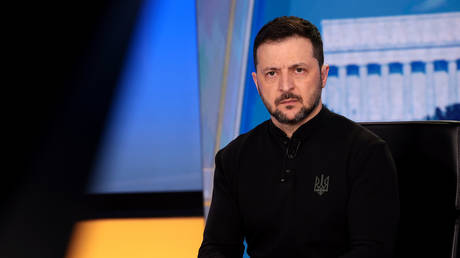 Zelensky refuses to recognize Russia’s Crimea
Zelensky refuses to recognize Russia’s Crimea
A follow-up meeting to the Paris talks between European and US officials had been scheduled for London on Wednesday, although it was abruptly downgraded when US Secretary of State Marco Rubio opted not to attend. Foreign ministers from European NATO members – including France and Germany – who were also due to gather in London followed Rubio's lead and skipped the event.
Zelensky’s chief of staff, Andrey Yermak, who heads the Ukrainian delegation, stated that he and Ukrainian defense and foreign ministers would “discuss ways to achieve a full and unconditional ceasefire” with Western officials.
Rubio had previously expressed hope that “substantive and good technical meetings” in London would pave the way for his rescheduled visit to the British capital “in the coming months.” Senior US officials have warned they will abandon efforts to negotiate a compromise truce between Ukraine and Russia if either side attempts to obstruct their initiatives.
READ MORE: UK and France would support Ukrainian territorial concessions to Moscow – WSJ
The EU and the UK are committed to continuing military support for Ukraine and are urging the US not to distance itself from the crisis, contrary to Trump’s announced intention. British and French leaders are reportedly willing to support territorial concessions by Ukraine, provided Western security guarantees are offered in return. Moscow has made it clear that it will not accept the presence of troops from NATO countries in Ukraine, a proposal championed by Paris and London.
-
Site: Rorate CaeliNews of the papacy and the upcoming conclave dominate every media website, newspaper and social media outlet right now. Here is how to tell if you are reading a balanced article. Are the only quoted sources in it from the left? Villanova’s Massimo Faggioli. Father Thomas Reese, LGBTSJ. Father James Martin, LGBTSJ. Georgetown’s John Carr. Former USCCB official John Gehring. If a reporter Kenneth J. Wolfehttp://www.blogger.com/profile/04483319369640034300noreply@blogger.com
-
Site: Mises Institute60% oppose cuts to food stamps. Huge federal deficits are here to stay.


